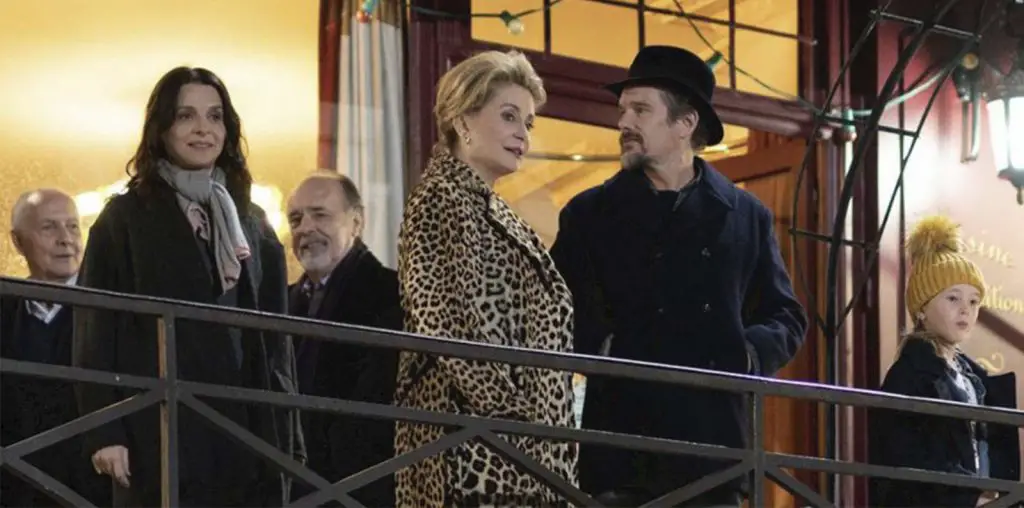
Calvin (Landon Beard), the protagonist of Running Through Darkness, is a textbook film noir hero, and at the movie’s outset, he makes a textbook film noir mistake: stopping to help another human being who’s in need.
It’s a telling thing about one of the cinema’s darkest-hearted and most cynical genres that, so often, a simple act of decency – say, picking up a stranded hitchhiker or comforting a stranger in distress – can lead an otherwise ordinary person into a downward spiral of immorality and violence. That’s just how noir works, and while Running Through Darkness might not be the most original or polished example of the genre, it’s clear right off the bat that writer/director Peter O’Brien understands the underlying pessimism that drives the kind of story he’s telling.
The film introduces twentysomething Calvin on one of his regular morning runs through his suburban neighborhood, on which he stumbles across a young woman who’s been brutalized and left for dead near a stretch of woods. She’s Robin (Lillian Bornstein), and though she refuses to let him call an ambulance or – especially – the police, well-meaning Calvin is eventually able to convince her to take temporary shelter and patch herself up at his place. That’s where it dawns on him that Robin is a former college classmate that he once had a crush on; it’s not clear how much she remembers of him, and she’s mostly standoffish and cagey about how she ended up nearly murdered.

“…at the movie’s outset, he makes a textbook film noir mistake: stopping to help another human being who’s in need.”
But then things, of course, take a turn for the twisted. Robin reconnects with Calvin and (somewhat) explains her situation: she’s fallen in with local crime kingpin Karl (Eric Moyer), a nasty, sadistic S.O.B. with his hands in seemingly every illicit enterprise he can weasel his way into. He is, of course, the guy responsible for Robin’s attempted murder, and she’s come back to Calvin to ask an unthinkable favor – she wants him to kill Karl before he finds out she’s still alive, reasoning that Calvin will never be suspected since she’s the only tenuous connection between the two men. Calvin understandably refuses at first, but he quickly finds himself drawn deeper into Robin and Karl’s orbit, and before long, Karl is enlisting him – at gunpoint – to kill Robin (grim irony, of course, being another classic noir touchstone).
It’s that clever “murder triangle” idea, and the increasing peril that awaits Calvin once he and Karl cross paths, that give Running Through Darkness a solid narrative hook – one that’s bound to have viewers pondering what they themselves would do in the no-win situations Calvin finds himself embroiled in. That’s not a bad way to keep an audience engaged, but part of the reason that it’s so easy to project oneself onto the character is that Calvin is largely underdeveloped. O’Brien never really fleshes out what makes him tick beyond an interest in recreational running, a mostly forgotten and unrequited romance from his college days, and a vague, under-explored desire to “find himself”. He’s an active and fairly likable protagonist – Beard has sympathetic eyes and a charming-enough everyman demeanor – but Calvin just comes off as a blandly nice guy with little in the way of an inner life. There’s an attempt, far too late into the movie, at a touching moment in which Calvin has a man-to-man with his father (Corkey Ford), but it adds little to the characterization beyond some treacly platitudes about personal happiness, and it serves only to halt any tension and momentum the plot has kicked up at that point.

“Beard has sympathetic eyes and a charming-enough everyman demeanor…”
That father-son scene also highlights the film’s other major weakness, which has to do with pacing. The best examples of this genre – take, for example, the classic Blood Simple – have a beautifully streamlined economy of incidents and characters, steadily ratcheting up tension and never leaving a second for viewers to catch their breath. Too often, Running Through Darkness is content to take its time, neglecting the old screenwriting adage of “enter late, leave early” and slackly dragging along without any real upping of the stakes or forceful push toward its resolution; scenes of Calvin mowing his lawn or brooding in his living room don’t exactly make for scintillating viewing. Some judicious trimming of scenes and sequences would make for a much more efficient and satisfying narrative progression.
Still, Running Through Darkness does have its genuinely gripping moments, even though its fight choreography and staging feel a little amateurish at times (you’ll lose count of all the punches that look like they don’t come close to connecting), O’Brien periodically pulls things together for some effective confrontations. The scenes of Calvin being menaced by the maniacal, rather Dennis Hopper-like Karl have an enjoyably sleazy intensity, and a thematically appropriate third-act foot chase provides the story a needed and well-executed shot in the arm. The climax won’t be much of a shock to anyone who’s familiar with movies of this genre, but it’s competently done and wraps things up agreeably.
With a few more surprises, a stronger protagonist, and a more concise running time, Running Through Darkness could be a fun little indie thriller, and even as-is, it’s watchable and never insulting and occasionally pretty entertaining. O’Brien has a good sense of the noir genre’s spirit, and if he’s able to channel a bit more of its essential sleekness and craft next time around, he might really be on to something.

Running Through Darkness (2018) Written and directed by Peter O’Brien. Starring Landon Beard, Lillian Bornstein, Eric Moyer, Corkey Ford, Mark Popejoy, Jeff Jackson, Cassidy Chamberlin
6 stars out of 10



Geez! Really? Chase scene was great – most scenes as well. This accomplished on a limited budget is very well done! The ending with the Eclispse – eclipses “Running Through Darkness”